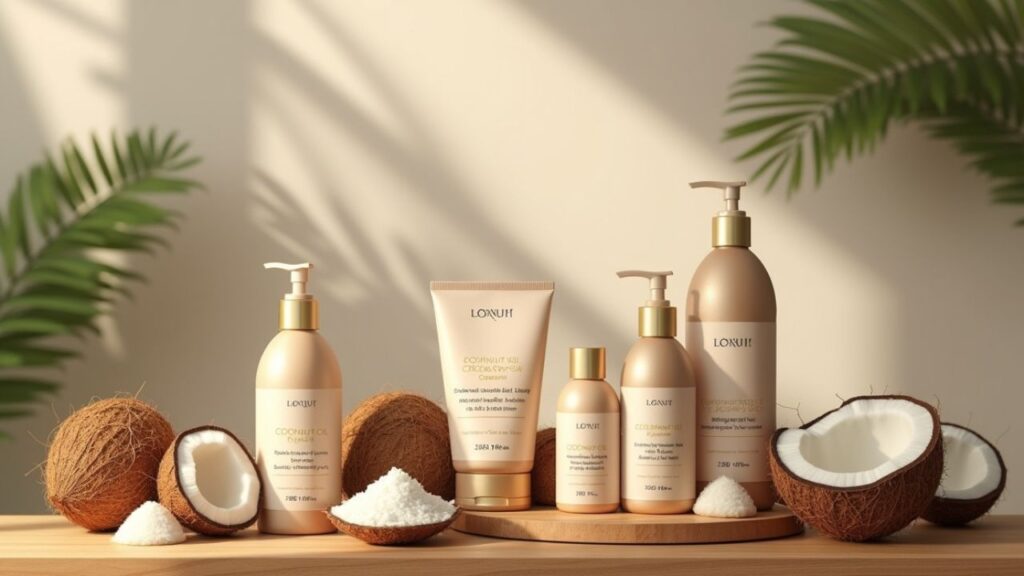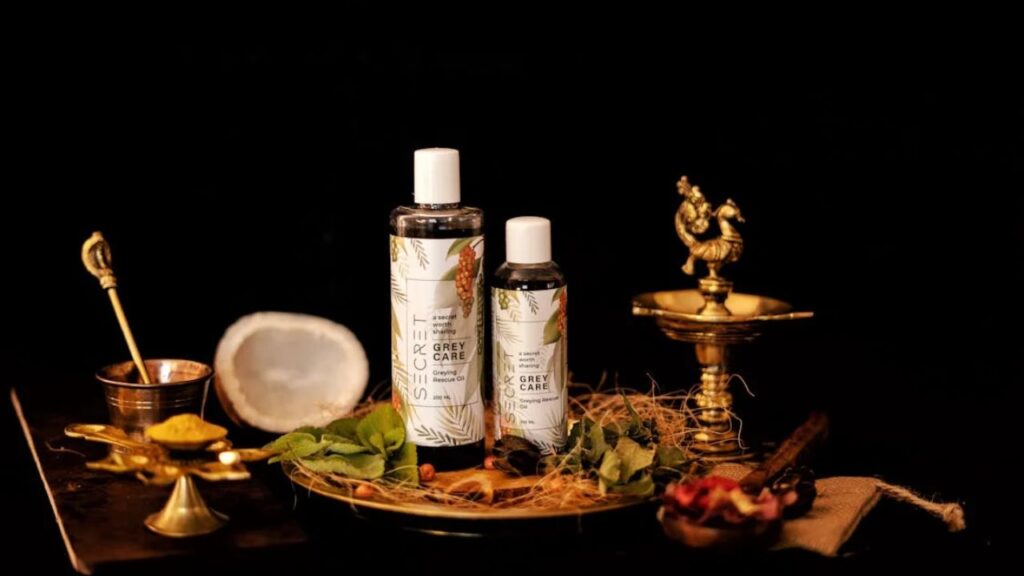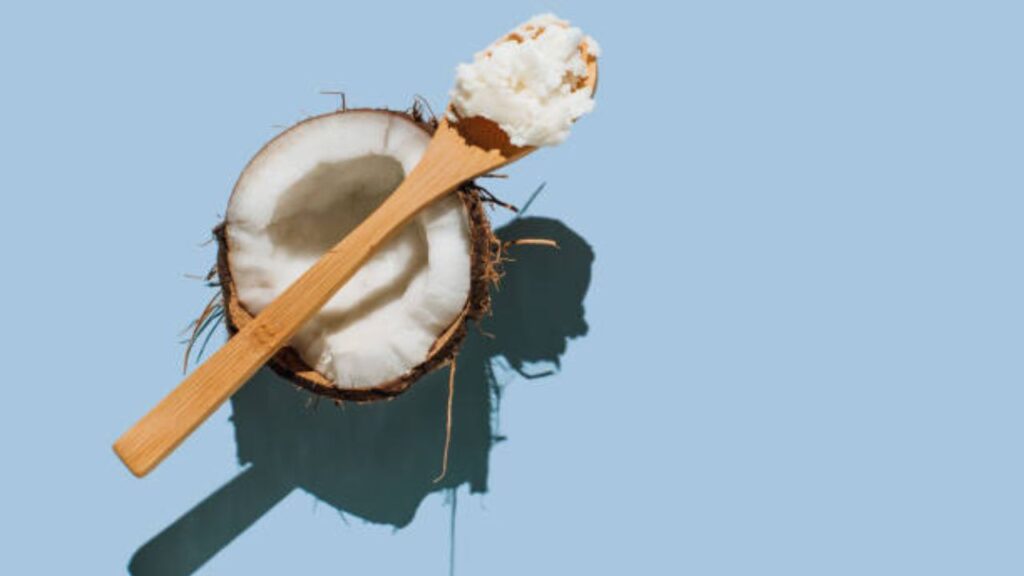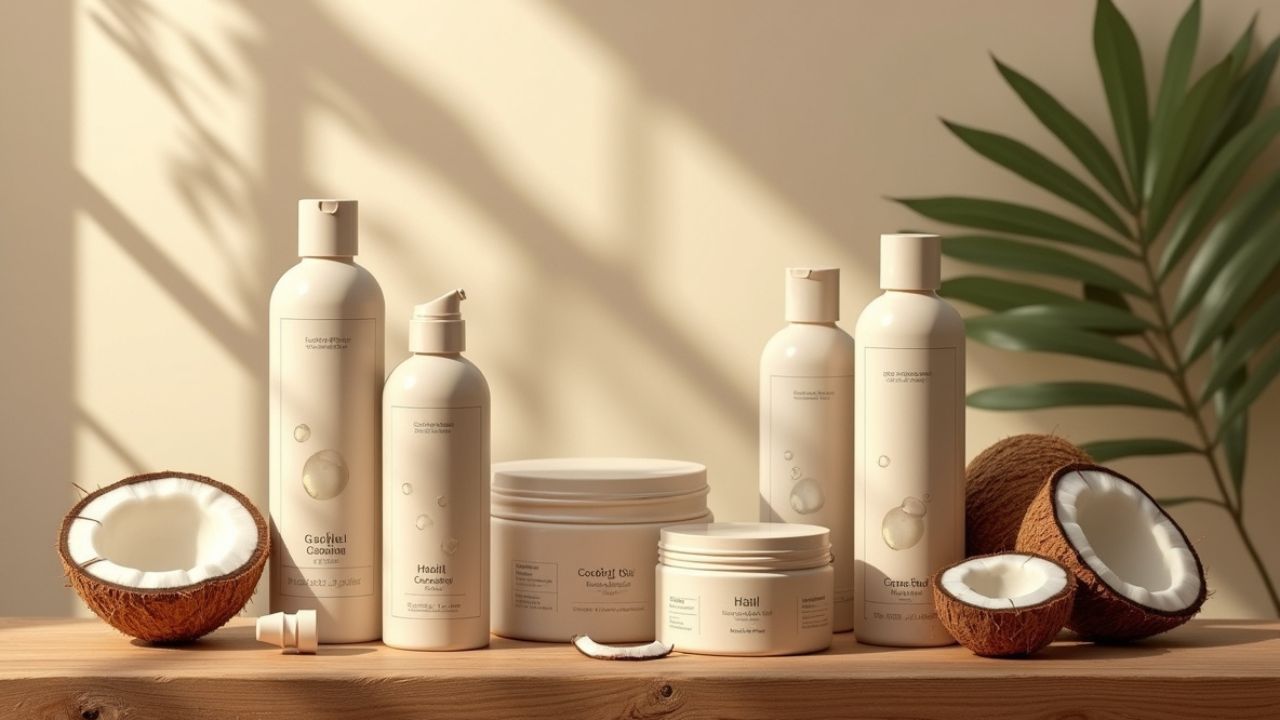For good reason, coconut oil has long been a preferred beauty secret for centuries. Regarding hair care, it’s like a miracle potion addressing dryness, frizz, and damage while being absolutely natural. Whether you know nothing about coconut oil or want to learn more about its advantages, this guide will explain why “coconut oil hair food” belongs permanently in your regimen. Let’s see how this tropical gem could change your hair.

Why Coconut Oil is the Perfect Hair Food
Not only a culinary must, coconut oil is a powerhouse for hair health. Since coconut oil is loaded with fatty acids like lauric acid, which profoundly nourish and strengthen strands, it functions as a natural “hair food” unlike many store-bought products. Its unusual structure lets it pass into the hair shaft and heal damage from the inside out. reduced split ends, reduced breakage, and smoother, shinier hair follow from this. It’s also lightweight, hence if applied properly it won’t make your hair greasy. Coconut oil suits your hair whether it is wavy, straight, thick, or fine.
How Coconut Oil Nourishes Dry and Damaged Hair
Dry, brittle hair is thirsty for moisture; coconut oil provides. For dry strands, its moisturizing qualities function like a drink of water. Applied consistently, this natural hair food locks moisture into the hair cuticle, therefore avoiding dryness brought on by pollution, heat styling, chemical treatments, or other processes. Coconut oil helps restore protein loss, thereby restoring elasticity and strength, for damaged hair (think of bleach or regular coloring). Massage a tiny bit into your ends or apply it as an overnight mask to wake up with better, more under control hair.
DIY Coconut Oil Hair Masks for Every Hair Type
They can give your hair a few changes without costly salon procedures. TLC. Try these easy DIY coconut oil hair food masks:
- For Dry Hair: Stir one tablespoon honey with two tablespoons of heated coconut oil. Apply from roots to ends; leave for thirty minutes; then rinse.
- For Oily Scalps:Combining one spoonful of coconut oil with one tablespoon of aloe vera gel will balance oil output.
- For Curly Hair: Toss the smashed avocados with coconut oil for additional definition and bounce..
- For Color-Treated Hair :Combining coconut oil with just a few drops of oils of rosemary will help to prevent fading of color.
These recipes are customizable, affordable, and free from harsh chemicals!
Coconut Oil as a Natural Heat Protectant
You might be surprised to learn coconut oil protects your hair from straighteners and blow driers. Wash your hair softly and then run a pea-sized bit between your palms before style. The oil locks in moisture and acts as a protective barrier, therefore lowering heat damage. Coconut oil won’t build up over time unlike silicone-based serums. Just keep in mind: A little goes a lot. Those who style their hair every day yet wish to avoid dryness may find this approach very useful.

Fighting Dandruff and Scalp Issues with Coconut Oil
Great hair starts from a healthy scalp, hence coconut oil is a mild treatment for flakes and itching. Its antifungal qualities fight dandruff-causing yeast, and its calming qualities quiet inflammation. Warm one tablespoon of coconut oil and massage it five to ten minutes into your scalp. Leave it on for one hour, or overnight, before washing. Add tea tree oil or apple cider vinegar for additional scalp treatment. Use routinely to lessen dryness and encourage a happier and better scalp.
Coconut Oil vs. Other Oils: What Makes It Unique?
Popular are almond, olives, and argan oily substances; coconut oil is very adaptable. While other oils usually sit on the surface, its tiny molecules pierce further into the hair shaft. Because coconut oil has a stronger affinity for hair proteins, it also helps to prevent protein loss—a typical problem with either weak or overly treated hair. Said another way, combining coconut oil with lighter oils like jojoba results in a balanced treatment for fine hair types.
How to Use Coconut Oil Without Weighing Hair Down
Either thin or fine hair? Not an issue at all. Moderation is really essential. Steer clear of using coconut oil close to the roots as it will flattish hair. Pay especially close attention to the mid-lengths and ends, which often dry out. Use it lightly; start with a dime-sized quantity and change as necessary. Try “pre-pooing,” (applying oil before shampooing), to enable your hair absorb benefits without residue if it feels heavy. Less thick and staying liquid, fractionated coconut oil is another option.
Coconut Oil for Hair Growth: Myth or Reality?
Coconut oil promotes a healthy environment for growth even if it does not magically cause hair to grow quicker. Over time, hair seems longer by avoiding split ends and breaking. Coconut oil massaging of the scalp increases circulation, which can help follicles to remain active. For maximum effects, use it with a balanced diet high in vitamins—like biotin. Consistency is important; frequent haircuts and mild maintenance count more than temporary remedies.

Styling with Coconut Oil: Tame Frizz and Boost Shine
Avoid the serums heavy in silicone! A small dab of coconut oil may gloss flyaways and smooth edges. Between your fingertips, gently glide over frizzy sections or ends rubbing a pinhead-sized quantity. For slick-back, braided, or updos, it looks fantastic. To emphasize curls not crunch for curly locks, dab a tiny bit into damp hair. Pro advice: Use it on dry hair for touch-ups; avoid overapplying to prevent greasiness.
Eco-Friendly Hair Care: Why Coconut Oil Wins
Most commercial hair treatments include synthetic components and are housed in plastic bottles. On the other hand, coconut oil is biodegradable and usually presented in glass jars or environmentally friendly packaging. Choosing this natural hair nourishment not only helps you to nurture your hair but also lessens your environmental effect. Furthermore versatile—use it for cooking, skin care, or even as a makeup remover!
Coconut Oil vs. Common Hair Care Solutions
| Feature | Coconut Oil Hair Food | Store-Bought Products |
| Penetration | Deeply moisturizes hair shaft 🌴 | Often sits on the surface 💧 |
| Ingredients | 100% natural, no chemicals 🥥 | May contain sulfates/silicones 🧪 |
| Cost | Affordable (one jar lasts months) 💸 | Recurring expense for bottles 💳 |
| Scalp Health | Fights dandruff + soothes itchiness 🧴 | Some formulas can irritate sensitive scalps 😣 |
| Eco-Friendliness | Biodegradable, often plastic-free 🌎 | Plastic packaging + synthetic chemicals ♻️ |
| Versatility | Doubles as skin care, cooking oil, etc. 🎨 | Single-purpose use 🧴 |
Why Coconut Oil Hair Food? Here’s the Scoop!
Should you have ever felt as though your hair is caught in a cycle of dryness, frizz, or breakage, coconut oil might be your new best friend. This is the reason it works.
It’s Closer to Nature
Most hair products have unpronounceable substances in great abundance. Conversely, coconut oil is mild, pure, natural—even on sensitive scalps. Just food; no adverse effects at all.
It’s a Time-Tested Fix
Grandma was not mistaken! In tropical areas, coconut oil has long been used to protect hair from humidity, sun, and seawater. Modern science supports its capacity to lower protein loss—that is, hey, stronger strands!
It’s Budget-Friendly
One container will cover costly serums, conditioners, and scalp treatments. Moreover, a little goes a lot; monthly splurging is not necessary.
It Adapts to Your Hair
Coconut oil changes according to your style: curly, straight, greasy, color-treated. It bends to your routine whether used as a mask, heat protectant, or shine enhancer.
It Loves the Planet
Not one plastic item or synthetic runoff. Just a basic component friendly to your hair and the surroundings.
The Bottom Line: One does not follow trends with coconut oil. This is a sensible, all-encompassing approach to take care of your hair free from shame or guessing. All set to start it? Start modest, keep regular, and allow your hair benefit from your consistency.
Final Thoughts
Coconut oil is a timeless answer for better, happier hair; it is not a trend. From fixing damage to adding gloss, this natural marvel is nearly universally useful. Start small: try a weekly mask, change your serum for coconut oil, or massage your scalp. Pay attention to the demands of your hair, change amounts as you go, and savor the path to stronger, silkier strands. Your hair as well as the earth will appreciate it!
FAQ’s
1. How often should I use coconut oil on my hair?
Most hair types need one to two times a week. Try a weekly overnight mask if your hair is especially damaged or dry. Fine or greasy hair? Use a little quantity just on ends, one to two times a month.
2. Can coconut oil make my hair greasy?
It can, if you overdo it! Start with a pea-sized quantity and work toward mid-lengths and ends. First, always warm the oil in your palms to assist distribute it equally without dragging hair down.
3. Does coconut oil work for oily scalps?
Definitely! To prevent too much oil building up, mix it with apple cider vinegar or aloe vera gel. Apply for 20 to 30 minutes just on the scalp to regulate moisture and minimize flakes before washing.
4. Will coconut oil help my hair grow faster?
Although it slows down development, it does reduce breakage and split ends, which over time elongates hair. For optimum effects, mix it with a good diet and scalp massages.
5. Can I use coconut oil as a leave-in conditioner
Totally! To add gloss and control frizz in damp hair, dab a little amount—less than a dime-sized drop. Steer clear of roots to maintain light, bouncy hair.
